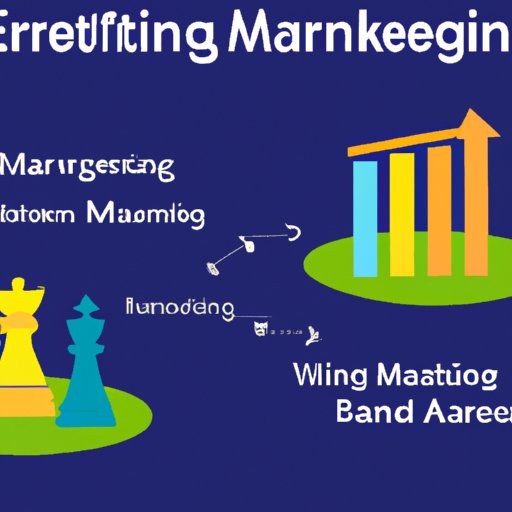Introduction
Marketing strategy refers to the process of planning and executing activities related to the promotion of products or services in order to achieve desired goals. A successful marketing strategy needs to be tailored to meet the specific needs of a business and its target audience. This includes outlining tactics that will reach the right people, build brand awareness, and generate leads and sales.

Outlining Different Types of Marketing Strategies and Examples
When it comes to marketing strategies, there are two primary approaches: traditional and digital. Traditional marketing strategies include activities such as advertising, public relations, direct mail, and cold calling. Digital marketing strategies use online channels such as social media, search engine optimization (SEO), content marketing, and pay-per-click (PPC) advertising.
Traditional Marketing Strategies
Advertising involves creating materials such as print ads, radio spots, and television commercials to promote products or services. Public relations involves building relationships with members of the press and using them to get favorable coverage of a brand. Direct mail advertising for businesses involves sending physical materials such as brochures and postcards to potential customers. Cold calling involves making direct phone calls to potential customers to introduce them to a product or service.
Digital Marketing Strategies
Social media involves leveraging platforms such as Facebook, Twitter, and Instagram to engage with customers and prospects. SEO involves optimizing website content and other elements to improve search engine rankings. Content marketing involves creating blogs, videos, and other materials to educate and inform potential customers. PPC advertising involves paying for ads on search engines and other websites in order to drive traffic to a website.
Exploring Popular Examples of Successful Marketing Strategies
Many companies have used successful marketing strategies to increase brand visibility and generate more sales. One example is Coca-Cola’s “Share a Coke” campaign, which featured bottles with people’s names printed on them. This campaign increased sales by double digits and improved Coca-Cola’s brand recognition. Another example is Apple’s iPhone launch, which used a combination of traditional and digital marketing tactics to create a huge amount of buzz around the product.
KFC’s “Finger Lickin’ Good” slogan is another example of a successful marketing strategy. The slogan helped KFC stand out from its competitors and has been used for decades. Oreo’s “Daily Twist” campaign is yet another example of a successful marketing strategy. This campaign involved creating daily pieces of content featuring different variations of Oreo cookies, which generated a lot of engagement.
Examining Ways to Develop an Effective Marketing Strategy
Developing an effective marketing strategy requires careful planning and execution. The first step is to identify your goals. This includes deciding what you want to achieve and how you plan to do it. Next, you need to research your target audience to understand their needs and preferences. It’s also important to understand your competition so you can differentiate yourself from them.
Once you’ve identified your goals and researched your target audience, you need to set your budget. You should consider both short-term and long-term costs when setting your budget. Finally, you need to plan your tactics. This includes choosing the channels you’ll use to reach your target audience and deciding what type of content you’ll create.

Investigating How to Measure the Success of a Marketing Strategy
Measuring the success of a marketing strategy is essential in order to determine whether or not it’s working. The first step is to establish baseline metrics so you can track your progress over time. This includes tracking key performance indicators (KPIs) such as website visits, leads generated, and sales made. You should also track results over time to see how your strategies are performing.
It’s also important to utilize analytics tools to measure the success of your marketing strategies. These tools can provide insights into which channels are driving the most traffic and engagement. By understanding this information, you can make adjustments to your strategies in order to maximize their effectiveness.
Understanding the Benefits of Using a Variety of Marketing Strategies
Using a variety of marketing strategies can help businesses reach a wider audience and improve their chances of success. It can also help to increase brand recognition and boost engagement. By using multiple channels, businesses can ensure that their message is reaching the right people.
For example, a business might use a combination of traditional and digital marketing tactics to reach their target audience. They could use TV ads to raise awareness about their brand, while also leveraging social media to engage with customers and prospects. This approach helps to ensure that the message is reaching the right people and resonating with them.

Discussing the Impact of Digital Marketing on Formulating a Strategy
Digital marketing has had a major impact on the way companies formulate their marketing strategies. The rise of digital has made it easier for businesses to reach potential customers, as well as to measure the success of their campaigns. In addition, technology has made it easier to create engaging content and deliver it to the right people.
Leveraging technology also allows businesses to personalize their messages and tailor them to their target audience. For example, they can use data to create highly targeted campaigns and optimize them for maximum effectiveness. Finally, digital marketing makes it easier for businesses to meet customers where they are, whether it’s on social media, search engines, or other online channels.
Conclusion
In conclusion, a successful marketing strategy requires careful planning and execution. It’s important to identify goals, research your target audience, understand your competition, set a budget, and plan your tactics. Measuring the success of a marketing strategy is also essential in order to make adjustments and optimize performance. Finally, using a variety of marketing strategies and leveraging digital technologies can help businesses reach their desired goals.
(Note: Is this article not meeting your expectations? Do you have knowledge or insights to share? Unlock new opportunities and expand your reach by joining our authors team. Click Registration to join us and share your expertise with our readers.)
